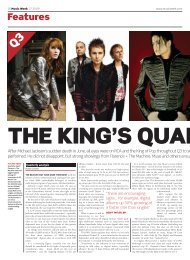Remake, Remodel: The Evolution Of The Record Label
Remake, Remodel: The Evolution Of The Record Label
Remake, Remodel: The Evolution Of The Record Label
You also want an ePaper? Increase the reach of your titles
YUMPU automatically turns print PDFs into web optimized ePapers that Google loves.
This pre-draft version is strictly for review purposes only and is not for general dissemination or sharing.<br />
From straight royalty deals to complex partnerships<br />
A clear trend today is towards partnership where both parties can feel they are<br />
incentivised to achieve the same thing. This can spread the risk for the record label<br />
and increase the participation in success for the artist.<br />
Brian Message of ATC, Courtyard Management and current Chairman of the Music<br />
Managers Forum prefers the partnership to be as extensive as possible. ‘I am a big lover<br />
of 360-degree partnership deals,’ he says. ‘<strong>The</strong> notion of all income and all costs being<br />
shared by like minded partners with profits being split in whatever ratio is agreed,<br />
works for me. <strong>The</strong> alignment of financial interests is especially key in my opinion.’<br />
Message devised a partnership deal for his act Hadouken in 2007 and presented it to<br />
record labels for consideration. <strong>The</strong> Atlantic label (part of Warner Music Group - WMG)<br />
was interested in experimenting with deal structures and liked the band, so the deal was<br />
finalised with them. Message sums up the deal as follows: ‘Atlantic had a share of all<br />
revenue streams, as part of a partnership deal, but the act got back their copyright after<br />
10 years.’<br />
Message ultimately felt that the deal proved a step too far for senior management at the<br />
label who, he says, found it difficult to accept the reversion of copyright after such a<br />
short term. This is unsurprising as the traditional label model was based on labels<br />
owning copyrights, and exploiting them in return for royalty payments to artists.<br />
‘<strong>The</strong>y [WMG] were in the business of acquiring copyrights as that’s the business they<br />
have always been in and that’s the business they know,’ he says.<br />
Message believes that the relationship between artist and label can benefit significantly<br />
from deals along these lines. ‘Blaming the label is often is a cop out for acts and<br />
managers,’ he argues. ‘But with a JV where the act and the manager are the key decision<br />
makers, there is nobody to blame! Psychologically and creatively, it makes a whole scale<br />
of difference.’<br />
<strong>The</strong> role of the artist manager has become more important as the industry has<br />
recognised and become skilled at exploiting the many potential income streams that can<br />
be generated by a successful artist. <strong>The</strong> manager normally is the only person in the value<br />
chain who is empowered to deal with every one of these income streams and advise the<br />
artist how best to monetise each one.<br />
In one sense, artist management is the original 360 deal 4 ; record labels are moving into<br />
this area, through acquisition and internal organic growth of a wide range of artist<br />
services across live, merchandise and artist management 5 .<br />
John Reid, CEO, Warner Music Europe & International Marketing, Warner Music Group,<br />
says this strategy is core to Warner Music’s thinking, but acknowledges that broadening<br />
the skills mix is an on-going process.<br />
4 Cheques, Hugs & Rock ‘n’ Roll: <strong>The</strong> Changing Face of Artist Management, Dec 2007 – last accessed 09.05.11<br />
5 Deal Or No Deal? <strong>The</strong> Great Artist/<strong>Label</strong> Trade-<strong>Of</strong>f, Feb.2008 – last accessed 09.05.11<br />
8



